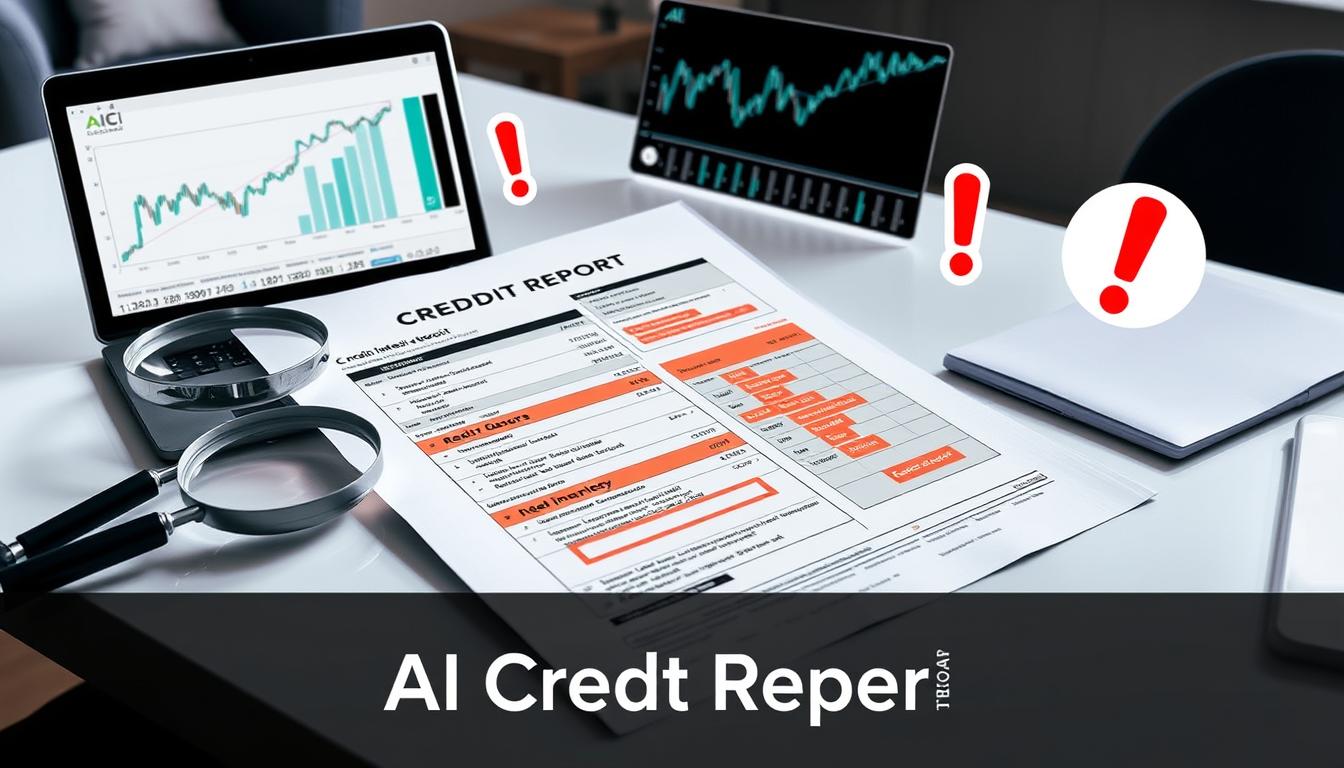Your credit score is vital for your financial health. But what if credit bureaus issue an exception notice? This guide explains credit score exceptions, their causes, and how to handle them.
Credit scores help lenders assess your creditworthiness. They’re based on factors like payment history and credit utilization. Sometimes, credit bureaus may issue an exception notice.
This notice suggests that the standard credit scoring model might not accurately reflect your creditworthiness. It’s important to understand and address these exceptions promptly.
Key Takeaways
- A credit score exception notice is a notification from credit bureaus that the standard credit scoring model may not accurately reflect your creditworthiness.
- Exceptions can occur due to inaccurate information on your credit report or identity theft and fraud.
- Handling a credit score exception notice involves understanding the reason, disputing any errors, and monitoring your credit reports regularly.
- Credit score exceptions can impact loan applications, so it’s important to address them promptly.
- Maintaining good credit habits and regularly monitoring your credit reports can help protect your credit score after an exception.
Understanding Credit Score Exception Notices
Credit score exception notices are vital for consumers in finance. Credit bureaus issue these alerts about potential problems in credit reports. They help you stay informed and protect your credit profile.
What is a Credit Score Exception Notice?
A credit score exception notice comes from credit bureaus like Experian, Equifax, or TransUnion. It flags possible issues or discrepancies in your credit report. These notices inform you about errors or fraud that might affect your credit score.
Why Do Credit Bureaus Issue Exception Notices?
Credit bureaus send exception notices to alert you about inaccurate information. This could include wrong account balances, payment histories, or personal details. They also flag potential identity theft or fraud signs.
These notices help you take action against credit report discrepancies. They empower you to address any credit score exceptions that may exist.

Quick action on credit score exceptions is crucial. Unresolved issues can harm your financial health long-term. Understanding these notices helps you maintain an accurate credit profile.
Common Reasons for Credit Score Exception Notices
Credit score exception notices can occur for various reasons. These include incorrect information on credit reports and identity theft. Let’s examine these common causes closely.
Inaccurate Information on Credit Reports
Incorrect details on your credit report often lead to exception notices. This may involve errors in account information or payment history. Sometimes, accounts not belonging to you appear on your report.
These mistakes can greatly affect your credit score. As a result, credit bureaus may issue an exception notice.
Identity Theft or Fraud
Identity theft or credit report fraud frequently cause exception notices. Criminals might open accounts using your name. This unauthorized activity can harm your credit.
Credit bureaus may send an exception notice while investigating such issues. They work to resolve these problems and protect your credit.
Regular credit report checks are vital to catch these issues early. If you spot errors or signs of theft, dispute them right away. Taking action helps safeguard your credit score and financial health.

| Reason for Credit Score Exception | Impact on Credit Score |
|---|---|
| Inaccurate account information | Significant negative impact |
| Identity theft or fraud | Severe negative impact |
Protecting your credit score is essential for maintaining financial stability and accessing favorable loan terms. Addressing credit score exceptions promptly can help you regain control of your credit profile.”
Handling a Credit Score Exception Notice
A credit score exception notice can be unsettling. It’s crucial to act quickly to address the issue. Start by reviewing your credit report to understand the reason for the exception.
This review will help you gather documents for the dispute process. You’ll need these to challenge the exception with the credit bureau.
When handling a credit score exception notice, consider the following steps:
- Review your credit report: Closely examine your credit report to identify the specific information that has led to the exception notice. This could be inaccurate data, signs of identity theft, or other issues that need to be addressed.
- Gather supporting documentation: Collect any relevant documents or evidence that can help support your case, such as proof of identity, payment records, or correspondence with creditors.
- Initiate the dispute process: Contact the credit bureau that issued the exception notice and follow their established process for disputing the information. This typically involves submitting a written dispute letter and providing the supporting documentation.
- Monitor the progress: Keep track of the dispute process and follow up with the credit bureau to ensure your case is being addressed in a timely manner. Be prepared to provide additional information or clarification if requested.
Taking these steps helps address credit score exception notices effectively. You can work towards fixing issues on your credit report. This process is vital for maintaining a good credit profile.

Dealing with a credit score exception takes time and effort. However, it’s worth it to protect your financial health. Your dedication can lead to a stronger credit profile.
Disputing Inaccurate Information on Your Credit Report
Inaccurate information on your credit report can affect your credit score. You have the right to dispute these errors. This guide will help you challenge incorrect data and protect your credit score.
Step-by-Step Guide to Disputing Credit Report Errors
Follow these steps to dispute inaccuracies on your credit report:
- Thoroughly review your credit report to identify the specific errors or inaccurate information.
- Gather supporting documentation, such as receipts, bills, or other evidence that can substantiate your claim.
- Draft a clear and concise dispute letter addressed to the credit bureau(s) reporting the incorrect information.
- Submit your dispute letter, along with the supporting documents, to the credit bureau(s) either by mail or online.
- Follow up with the credit bureau(s) to ensure your dispute is being investigated and to track the progress.
- If the credit bureau(s) do not resolve the issue to your satisfaction, consider escalating your dispute to the Consumer Financial Protection Bureau (CFPB).
The credit report dispute process helps maintain accurate credit information. By taking action, you can challenge credit report errors effectively.
This process safeguards your credit score and ensures your financial information is correct.

“Maintaining the accuracy of your credit report is essential for financial well-being. Don’t hesitate to dispute any inaccuracies – your credit score and financial future depend on it.
This guide will help you resolve credit bureau dispute guidelines. It ensures your credit report accurately reflects your financial history.
Protecting Your Credit Score After an Exception
After resolving a credit score exception, stay alert to protect your credit. Monitor your credit reports often. Practice good credit habits to keep a healthy score.
Monitoring Your Credit Reports Regularly
Check your credit reports from Experian, Equifax, and TransUnion often. This helps spot any leftover issues or new problems. Regular checks let you fix mistakes quickly.
Practicing Good Credit Habits
Good credit habits are vital for protecting your score after an exception. These habits help you rebuild trust with lenders.
- Making timely payments on all your credit accounts
- Keeping your credit utilization rate low (below 30% of your available credit limit)
- Avoiding applying for new credit unnecessarily
- Diversifying your credit mix with a variety of account types
Stick to these habits to show lenders you’re a responsible borrower. This helps improve your credit profile over time.
Protecting your credit score after an exception requires vigilance and a commitment to good financial practices. By staying on top of your credit reports and making responsible decisions, you can rebuild and maintain a strong credit profile.
Credit Score Exception Notice and Loan Applications
A credit score exception notice can impact your ability to get loans or credit. Lenders examine these exceptions closely. They may indicate risks about an applicant’s creditworthiness.
Lenders worry about inaccurate or fraudulent information on credit reports. This can raise doubts about a borrower’s financial history. It makes lenders more cautious when reviewing loan applications.
Credit score exceptions may signal past financial troubles. These could include missed payments, defaulted loans, or bankruptcies. Lenders may see borrowers with exceptions as higher credit risks.
If you’ve received an exception notice, be proactive when applying for loans. Here are some helpful tips:
- Explain the exception: Provide a clear, honest explanation for the credit score exception. Include steps you’ve taken to address the issue.
- Gather supporting documentation: Collect relevant documents that demonstrate your creditworthiness. This evidence can help support your case.
- Consider alternative lenders: Some lenders work with borrowers who have credit score exceptions. Explore options beyond your usual financial institutions.
- Improve your credit profile: Pay down debts and dispute inaccuracies on your credit report. Build a strong payment history to boost your credit score.
Understanding how exceptions affect loan applications is crucial. Taking proactive steps can increase your chances of securing financing. You can overcome challenges posed by a credit score exception notice.
“While credit score exceptions can be a hurdle, they don’t have to be a roadblock to obtaining the financing you need. With the right approach and preparation, you can navigate the loan application process successfully.”
The Role of Credit Bureaus in Exception Notices
Credit bureaus are vital in the credit score exception process. They investigate disputes and communicate with consumers about exception notices. Understanding their role helps you navigate the process effectively.
Credit Bureau Responsibilities for Exceptions
When an exception notice is issued, credit bureaus must investigate thoroughly. They review credit report information and verify its accuracy. Their goal is to find the root cause of the exception.
The investigation process follows strict guidelines and timelines. This ensures a fair and timely resolution for consumers.
Credit Bureau Dispute Resolution
Consumers can dispute inaccurate or incomplete information on their credit report. Credit bureaus must investigate these disputes within a specific timeframe. They communicate with consumers and provide updates throughout the process.
If errors are found, credit bureaus take steps to correct them. This teamwork between consumers and bureaus is crucial for resolving exceptions.
| Credit Bureau Responsibilities | Description |
|---|---|
| Investigate Exceptions | Review credit report information, verify accuracy, and determine the cause of the exception. |
| Dispute Resolution | Respond to consumer disputes, communicate with the consumer, and take corrective action. |
| Timely Communication | Adhere to established timelines and guidelines for the exception and dispute resolution process. |
Knowing how credit bureaus handle exception notices helps consumers. It allows them to keep their credit report accurate and current.
credit score exception notice
A credit score exception notice can be overwhelming. It’s a message from a credit bureau about unusual issues affecting your credit report. These notices inform you about discrepancies that may impact your credit score.
Various factors can trigger these notices. They include incorrect information on your credit report, identity theft, or fraudulent activity. It’s vital to address these issues quickly to protect your financial health.
Decoding the Credit Score Exception Notice
A typical credit score exception notice provides key information. It explains the specific issue identified by the credit bureau. The notice also outlines potential impacts on your credit profile.
You’ll find instructions on how to dispute or correct information. The notice includes contact details for the credit bureau and additional resources. Understanding these details helps you take appropriate action.
- Explanation of the specific issue or discrepancy identified by the credit bureau
- Potential impact on your credit score and overall credit profile
- Instructions on how to dispute or correct the information, if necessary
- Contact information for the credit bureau and any additional resources or support
By understanding the notice, you can address problems and protect your financial standing. Taking swift action is crucial for maintaining a healthy credit report.
“Staying vigilant and taking proactive steps in response to a credit score exception notice can be the difference between maintaining a healthy credit report and facing potential financial challenges.”
Dealing with a credit score exception notice may seem challenging. However, with the right approach, you can manage the situation effectively. Your quick response helps safeguard your financial future.
Legal Rights and Recourse for Credit Score Exceptions
The Fair Credit Reporting Act (FCRA) protects your rights regarding credit score exceptions. It provides a clear process for disputing inaccurate information on your credit report. You can take action if you believe your exception stems from an error or fraud.
Credit bureaus must investigate disputed items within a set timeframe. They must correct any errors found and inform you of the results. The FCRA also allows you to request a free annual credit report.
This helps you spot discrepancies that could lead to credit score exceptions. You can monitor your report for any unusual activity or mistakes.
Consumer advocacy groups and legal resources can help with credit score exceptions. They offer guidance on the dispute process and your rights. These organizations can also assist with filing complaints to the Consumer Financial Protection Bureau.

